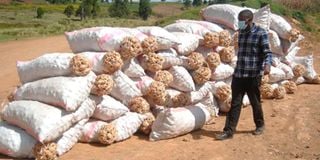Premium
Potato task force spells hope for farmers

Bags of potatoes weighing more than 80kg packed by the roadside in Mariashoni, Nakuru County, on January 5, 2021.
The fortunes of potato growers could improve after Agriculture Cabinet Secretary Peter Munya formed a 15-member National Potato Task Force to review production costs and propose changes.
The committee includes representatives of farmers, county government officials from potato-growing areas, research institutions and professionals in agribusiness.
The team will make workable recommendations on how best to commercialise Irish potato locally and in the international market.
It is also expected to propose ways of reducing the cost of production, increasing access to certified seeds, market linkages and subsidised farm inputs, and other policies and regulations meant to promote the potato industry.
CS Munya said the task force, chaired by National Potato Council of Kenya (NPCK) chief executive Mr Wachira Kaguongo, is expected to come up with radical changes akin to those in the coffee and tea industries.
The first critical issue it will address is enforcing a ban on imports of Irish potatoes starting in June.
The ban is among measures meant to safeguard local farmers.
Nyandarua Agriculture executive James Karitu, a member of the task force, was optimistic that it would provide workable solutions for the potato industry.
"The task force will end the farmer's years of agony and suffering in the hands of the brokers who determine the market prices. Value addition and how potato growing counties can be supported to go full addition, and streamlining the entire industry will be the focus of the task force,” Dr Karitu said.
CS Munya said: “The Agriculture ministry has partnered with potato-growing counties and other line ministries to improve on quality and quantity to meet standards desired by traders importing the produce. We have for decades consumed chips, crisps, and other by-products from locally produced potato.
"Visitors to Kenya enjoy the Kenyan-grown potato prepared in various products. There is no reason … anyone should source potato outside Kenya unless we have an acute shortage. We produce the best for the local and export market.”





